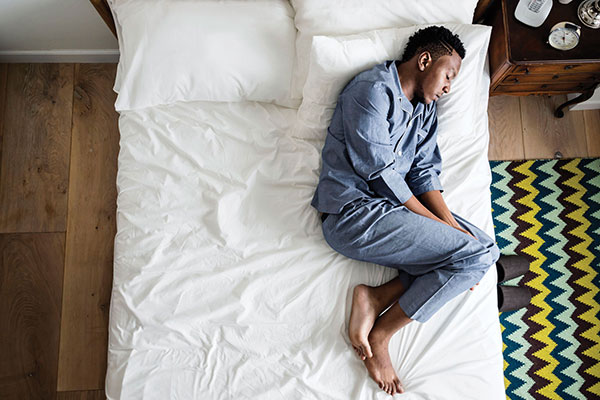Cancer Fatigue:
Strategies to help you cope
by Ellen Manzullo MD, FACP
Fatigue is one of the most common and distressing symptoms experienced by cancer patients and survivors. For some people, fatigue persists even years after completing treatment. Cancer-related fatigue is different from the fatigue we all experience in daily living. It is usually more severe, lasts longer, and can have a significant impact on your day-to-day life. Even simple activities like eating, bathing, talking on the phone, and grocery shopping can be difficult when you are experiencing cancer-related fatigue. In addition, the fatigue is often not related to recent activity, and normal rest might not help you feel more energetic.
Moreover, cancer-related fatigue is more than just a physical side effect. The fatigue can also be mental, as well as emotional. Those with mental fatigue may have trouble concentrating, performing simple mental tasks, and even reading a book. People with emotional fatigue may feel more irritable, anxious, or impatient. This, in turn, may cause difficulty in relationships with family and friends.
Many different factors can contribute to cancer-related fatigue. It can be caused by the cancer itself, or by cancer treatments (chemotherapy, radiation treatment, surgery, stem cell transplant, immunotherapy). Cancer-related fatigue may also be a sign of an undiagnosed medical condition, or one that is being inadequately treated. For example, heart disease, anemia, hypothyroidism, and sleep disorders (like sleep apnea) can all contribute to fatigue, as can pain, depression, and anxiety. Fatigue may also be triggered or exacerbated by certain medications (such as those used to treat pain, depression, anxiety, and nausea), as well as by what you eat.
Cancer-related fatigue is different from the fatigue we all experience in daily living.
For most people, cancer-related fatigue has more than one cause. And while the best way to manage fatigue is to treat the underlying cause, that can be difficult to pinpoint in cancer survivors. However, all hope is not lost. These fatigue-busting strategies can help you combat your cancer-related fatigue, no matter what the cause.
• Energy Conservation
If you are experiencing cancer-related fatigue, there are many things you can do to conserve your energy. First, plan your most important activities for times of the day when you have the most energy. Routine tasks can be scheduled throughout the week. It’s important to pace yourself and schedule periods of rest. When possible, delegate chores, such as strenuous housework, shopping, and laundry, to others. At work, try to arrange your environment to conserve your energy, and plan your most strenuous tasks during times of peak energy.
• Sleep Hygiene
A lack of good quality sleep can contribute to fatigue. However, you can take some simple measures to help you sleep at night. During the day, try to limit naps. If you do nap, try not to sleep for longer than 30 minutes. Make sure to exercise at least two to four hours before bedtime to give yourself time to recover. In the late afternoon and evening, avoid caffeine, chocolate, and alcohol. You may also want to limit liquid intake in the evening so that middle-of-the-night bathroom trips don’t disrupt your sleep.
When possible, delegate chores, such as strenuous housework, shopping, and laundry, to others.
Give yourself time to wind down at night. Starting at least one hour before bedtime, try to avoid mentally stimulating activities, such as watching TV, working on the computer, and playing video games. Make sure your bedroom environment is conducive to sleeping; it should be dark, cool, and quiet. If you have difficulty relaxing when trying to sleep, make a list of the things you need to do the next day, as this will likely help you relax. If you’re a “clock watcher,” turn the clock around. If you can’t fall asleep within 15 minutes, it’s fine to get up, go to another room, try listening to quiet music, and then go back to bed when you feel sleepy.
Aim to go to bed and wake up at the same time every day, even on the weekends. Spouses should try to go to bed at the same time as well. And, finally, if you’ve been told that you snore loudly or that you stop breathing while sleeping, you should discuss this with your doctor, who may refer you to a sleep specialist, as these are both signs of sleep apnea.
• Nutrition
The foods you eat can affect your energy levels. It’s important to try to eat a well-balanced diet with the right number of calories. Your diet should also include plenty of protein, such as lean meats, fish, eggs, low-fat yogurt and cheeses, and peanut butter. If you can’t eat three square meals a day, try eating smaller meals more often. In addition, make sure you stay well hydrated by drinking eight 8-ounce glasses of non-alcoholic, non-caffeinated fluids each day. A registered dietitian can help you create a nutrition plan that addresses your fatigue, as well as any other dietary concerns you may have.
• Exercise
When you are feeling fatigued, exercise is probably the last thing you want to do. However, if you want to keep your energy levels up, it’s important to remain active. Studies have shown that cancer survivors who exercise have more energy, are better able to perform everyday activities, have a better quality of life, and enjoy an improved sense of well-being.
Talk to your doctor before beginning any exercise regimen. Some people may even need an assessment from a physical medicine and rehabilitation physician or a physical therapist before beginning any physical activity. Once you have the all-clear, start slowly and give your body time to adjust to the increased physical activity. Walking is an easy exercise you can try while you’re just starting out. Exercise at your own pace, gradually increasing either the duration or the intensity of exercise (never both at the same time). Your goal should be to exercise for at least 30 minutes, five days a week.
• Restorative Therapy
Engaging in activities that you enjoy and that help you feel relaxed are beneficial in reducing your overall fatigue. Aim to set aside some time at least three days a week for an activity you enjoy. This can be listening to music, gardening, walking through a park, birdwatching, or visiting with friends and family. You could also try relaxation exercises or meditation. All of these things can be mentally and physically restorative.
For many cancer survivors, fatigue is one of those side effects that you just can’t avoid. However, with these strategies for combatting cancer-related fatigue, you can learn to manage it and keep fatigue from taking over your life.

Dr. Ellen Manzullo is a professor of Medicine at The University of Texas MD Anderson Cancer Center in Houston, TX. She is the clinical deputy division head for the Division of Internal Medicine and the clinical deputy department chair for the Department of General Internal Medicine. Dr. Manzullo is a general internist who evaluates and treats cancer survivors in the Fatigue Clinic at MD Anderson.
If fatigue persists and significantly interferes with your daily life, discuss this symptom with your healthcare provider right away.
This article was published in Coping® with Cancer magazine, January/February 2020.


